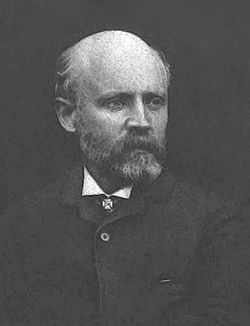George Croom Robertson | |
|---|---|
 | |
| Born | 10 March 1842 Aberdeen, Scotland |
| Died | 20 September 1892 (aged 50) |
| Education | University of Aberdeen |
| Spouse(s) | Caroline Anna Croom Robertson |
| Era | 19th-century philosophy |
| Region | Western Philosophy |
| Signature | |
George Croom Robertson (10 March 1842 – 20 September 1892[1]) was a Scottish philosopher. He sat on the Committee of the National Society for Women's Suffrage and his wife, Caroline Anna Croom Robertson was a college administrator.
Biography
He was born in Aberdeen. In 1857 he gained a bursary at Marischal College, and graduated MA in 1861, with the highest honours in classics and philosophy. In the same year he won a Fergusson scholarship of £100 a year for two years, which enabled him to pursue his studies outside Scotland. He went first to University College, London; at the University of Heidelberg he worked on his German; at the Humboldt University in Berlin he studied psychology, metaphysics and also physiology under Emil du Bois-Reymond, and heard lectures on Hegel, Kant and the history of philosophy, ancient and modern. After two months at the University of Göttingen, he went to Paris in June 1863. In the same year he returned to Aberdeen and helped Alexander Bain with the revision of some of his books.
In 1864 he was appointed to help William Duguid Geddes with his Greek classes, but he devoted his vacations to working on philosophy. In 1866 he was appointed professor of philosophy of mind and logic at University College, London. He remained there until he was forced by ill-health to resign a few months before his death, lecturing on logic, deductive and inductive, systematic psychology and ethics.
He left little published work. A comprehensive work on Hobbes was never completed, though part of the materials were used for an article in the Encyclopædia Britannica, and another portion was published as one of Blackwood's "Philosophical Classics." Together with Bain, he edited George Grote's Aristotle, and was the editor of Mind from its foundation in 1876 till 1891. Robertson had a keen interest in German philosophy, and took every opportunity to make German works on English writers known in the United Kingdom. In philosophy he was a follower of Bain and John Stuart Mill. He and his wife, the college administrator Caroline Anna Croom Robertson, were involved in social work;[2] he sat on the Committee of the National Society for Women's Suffrage, and was actively associated with its president, John Stuart Mill. He also supported the admission of women students to University College.
He died in 1892 joining his wife who died earlier that year.[3]
Works
- "Prefatory Words", from Mind, Volume I, Number 1 (January 1876).
- Review of Hughlings Jackson's Researches on the Nervous System, from Mind, Volume I, Number 1 (January 1876).
- Review of Cairnes's Logical Method of Political Economy, from Mind, Volume I, Number 1 (January 1876).
- "Sense of Doubleness with Crossed Fingers", from Mind, Volume I, Number 1 (January 1876).
- "Logic and the Elements of Geometry", from Mind, Volume I, Number 1 (January 1876).
- "The Physical Basis of Mind," Mind, Vol. III, 1878.
- "Philosophy in Education," Mind, Vol. III, 1878.
- "Psychology and Philosophy," Mind, Vol. VIII, 1883.
- Hobbes (1886).
- Philosophical Remains ...: with a Memoir (1894)
- Elements of General Philosophy (1896).
- Elements of Psychology (1896).
References
- ^ . Popular Science Monthly. Vol. 42. December 1892. ISSN 0161-7370 – via Wikisource.
- ^ "Robertson, Caroline Anna Croom (1837/8–1892), college administrator". Oxford Dictionary of National Biography (online ed.). Oxford University Press. 2004. doi:10.1093/ref:odnb/48679. Retrieved 18 July 2020. (Subscription or UK public library membership required.)
- ^ "Caroline Anna Crompton Robertson (1838-1892) -..." www.findagrave.com. Retrieved 19 July 2020.
Sources
- Alexander Bain: "George Croom Robertson" Mind (N. S.), Vol. 2 (1893), 1–14.
 This article incorporates text from a publication now in the public domain: Chisholm, Hugh, ed. (1911). "Robertson, George Croom". Encyclopædia Britannica (11th ed.). Cambridge University Press.
This article incorporates text from a publication now in the public domain: Chisholm, Hugh, ed. (1911). "Robertson, George Croom". Encyclopædia Britannica (11th ed.). Cambridge University Press.
External links
![]() Works written by or about George Croom Robertson at Wikisource
Works written by or about George Croom Robertson at Wikisource
- Works by George Croom Robertson, at Hathi Trust